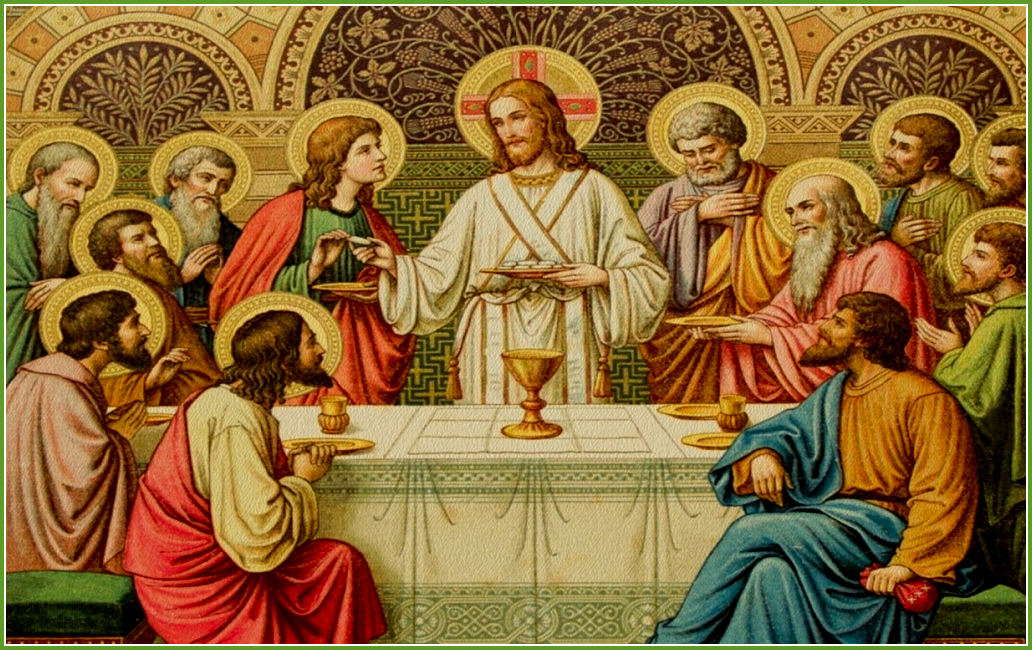

Excerpts from MEDITATION ON THE PASSION
Rev. Reginald Walsh, O.P.
Burns Oates & Washbourne LTD, London
with Nihil Obstat and Imprimatur, 1922
THE PASCHAL SUPPER
(I) Preparation for the Supper. (2) Our Lord's walk to Jerusalem. (3) The Supper.
See the persons - watch the actions - hear the words. Reflect and draw fruit from all.
See Jesus speaking to His disciples about the supper. It was on Thursday morning that our Lord called the disciples and told them to prepare the Paschal Lamb. In reply to their questions as to where He wished to celebrate the Pasch, He mysteriously told them of a man, who would meet them near the city gate; him they were to follow into his house, and there prepare the meal. This was on the fourteenth of the month, the first day of unleavened bread. (On this day all leaven and leavened bread had to be taken out of the house.) In this command of our Lord's we have three beautiful virtues upon which to meditate:
I. His loving and willing obedience. Wherever there is law to be kept, the day and hour find Him ready. He Himself gives the Apostles the order to go and prepare the Pasch. Do I yield the same loving, willing obedience to the precepts of the Church - our Lord's rule for His Own?
2. The second virtue that Jesus practises in making this arrangement is wise and prudent caution. He chooses Peter and John to go and make the preparations, not Judas, who may have performed such functions as a rule. Neither does Jesus name the man in whose house He intends to celebrate the Pasch, but only describes him mysteriously, saying that the two disciples would be met on entering the city by someone carrying a pitcher of water, whom they were to follow. 'Our Lord acted thus in order not to give Judas an opportunity of betraying Him, because Judas might have informed the enemies of Jesus of the time and place of the meal, and the arrest would have been made in the Crenaculum, and thus the Sacred Mysteries would have been disturbed and the host troubled. Our Lord willed that this should not happen. Probably the man to whom the disciples were sent was a disciple of Jesus - there is reason to think that he was the father of the Evangelist St. Mark.
3. We may see here another instance of our Lord's poverty. He is about to institute the great Mystery of the Blessed Sacrament of the Altar, and He has no house or room of His Own in which to do it. He must appeal to the charity of men for every great thing that He does for the good of the world. How touchingly He asks the host to grant Him admittance, in order to institute the mystery that is to be such a blessing to the whole world! Jesus had had no cradle, and was to have no grave of His Own; and now He has no church in which to institute and deposit the chief Sacrament of the Church.
(a) Preparation of the Paschal meal. Peter and John went and found everything as our Lord had predicted. The man met them, and showed them a large furnished room, and there they made all preparations.
Tradition says that the Crenaculum in which our Lord celebrated Pasch was on Mount Sion, in the highest part of the upper city. It lwas a arge room, twenty yards long and eleven broad, divided into two parts by a couple of pillars. The Apostles saw that all was in readiness for the Master - tables, utensils, couches. The lamb was bought and prepared. There were also cakes of unleavened bread, bitter herbs, lick, brick-coloured pottage made of dates, almonds, figs, and cinnamon, and lastly wine and water.
The Apostles made all these preparations gladly and lovingly. Peter and John are the representatives of faith and love - thus everything was done well. Our Lord's command sufficed to inspire them with zeal. For it was the first church that they were arranging and decorating.
(b) Our Lord's walk to Jerusalem. In the evening Jesus went with His disciples from Bethany to the dining-room in the upper city where Peter and John had everything in readiness.
Before Jesus and His disciples set out He must have bidden farewell to His dear friends who had shown Him so much love and reverence, and whose hospitality He had so often enjoyed. It was His last visit to the house of Lazarus and his sisters in the beautiful little hamlet under the shade of the fig, olive, and almond trees. Jesus was never to return there in this life. The Saints who have meditated upon this mystery draw us a touching picture of this farewell of Jesus to Lazarus and His many other friends. Such a parting is painful to every grateful and feeling heart, and so it must surely have been to our Lord.
We do not know whether the leave-taking took place in public, or in the presence of only a few; but there can be no doubt it was loving, touching, sorrowful on both sides.
Contemplate our Lord as He walks to the supper-room. The walk itself over the Mount of Olives and down the Vale of Cedron, through Ophel, up to the Cenacle in the upper city, probably was very silent sorrowful. Try to realize the feelings of the Human Heart of Jesus as He goes to the Passion. There in the gloaming lay the city with its towers and walls, dark and threatening, like a mighty prison-house or place of execution, ready to receive Him and put Him to a cruel death.
O faithful Heart of Jesus, in Thee I trust! Jesus walks on with firmness and decision, and neither the clear consciousness that His hour has come nor the shrinking fear that fills His Heart can delay His steps for a moment. O dear Jesus, strengthen my will to go forward with love, courage, and perseverance in Thy service - "To give and not to count the cost - to fight and not to heed the wounds."
This farewell to Bethany and walk to Jerusalem is a very profitable as well as a touching subject for meditation. Our Lord was human like ourselves, and susceptible to all natural feelings, as far as His will was concerned. It must have cost Him much to leave such faithful and loving friends - and caused sorrow to them as well as to Himself. Jesus would remember how greatly they desired His welfare - how heartily they loved Him, and how happily He might have lived with them. He would think, too, of where He was going - He was about to deliver Himself into the hands of His enemies, and oh! what a terrible fate was in store for Him.
How hard it must have seemed to Jesus at that moment to fulfill His vocation. But He overcame all His pain and repugnance - for me - to set me an example, and gain for me the graces I need, when called upon to face pain, humiliation, and separation from those dear to me. "He loved me, and delivered Himself to death for me." When difficulties and trials surround us, let us call to mind how our Lord went through His Sacred Passion with all its attendant ignominies and sufferings - and how His sacrifice calls for ours in return. O Sacred Heart of Jesus, make our hearts like Thine!
(c) The Paschal Supper. "And when the hour was some, He sat down and the twelve Apostles with Him." See the Apostles take their places at table -t he number should not be less than ten nor more than twenty. See them arranged at the table - arrayed as for a journey, girded, and with staves in their hands. Our Lord said the prayer and performed the ceremony of washing His hands. All the ceremonies prescribed were faithfully fulfilled.
Hear the conversation between our Lord and His Apostles. It turned upon these topics: (1) The signification of this peculiar Pasch. Whilst the second chalice was being passed round, amongst other things, He said: 'With desire I have desired to eat this Pasch with you before I suffer. For I say to you, that from this time I will not eat it, till it be fulfilled in the Kingdom of God. ... I will not drink of the fruit of the vine, till the Kingdom of God come" (Luke xxii. 15-18).
This Supper, combining the ceremonies of the Old Testament with the reality of the New, is the last meal of Jesus before His farewell to His loved disciples and to the world; it is the type and the introduction to the eternal banquet in Heaven. It is the intensest love of the Man-God shown in the mysteries; this Supper was to witness the washing of the feet, the Institution of the Blessed Eucharist, and Jesus' parting discourse to His Own, so that we may truly say of it: "Having loved His Own who were in the world, He loved them to the end" - that is, the very utmost, giving them on this occasion an extraordinary proof of His love.
(2) The second subject was the impending Passion - this He meant when He said the words, "Before I suffer "- but Jesus speaks more fully of the Passion in the prediction of His betrayal by Judas. Our Lord desired to save Judas, and His reasons for speaking of the betrayal were to show that He knew everything and that He suffered voluntarily - to warn the unhappy Apostle and deter him from committing his sin; and to show how this treachery pained Him - "Amen, amen, I say to you, that one of you is about to betray Me." This prediction brought great consternation and sorrow upon the Apostles, as we may well imagine; and though everyone of them, except Judas, was convinced that such a thought had never entered his head, still they grew sad and bewildered, and fearing their own weakness, anxiously look at Jesus and appealingly ask: "Is it I, Lord?" See their distress - hear them ask each other who it could possibly be. (Luke xxii. 23.) (And they began to inquire among themselves, "which of them it was that should do such a thing.")
(3) The third subject of conversation was a dispute about precedence. Each may have claimed to be more attached to our Lord; or the mention of His departure revived the old jealousy about places in the Kingdom; whatever it was, a dispute arose among the bewildered, anxious, and troubled hearts of His Own.
It will be well to sound my heart, and see if there be any weakness which might lead me to be disloyal to our Lord. Ask light to see how I stand with our Lord. Can He trust me under all circumstances?
COLLOQUY. - O most loving Jesus, draw me entirely to Thyself. Gran that I may henceforth love Thee with all the tenderness, devotion, and love of my heart. Lord Jesus, take me out of life rather than permit me to be unfaithful to Thee. Mother, I have need of thee!


HOME ------------------------------------------------------------------------------------------------------------------------------------------------------------------------------------------------------------------------ CHRIST THE KING
www.catholictradition.org/Passion/passion34a.htm